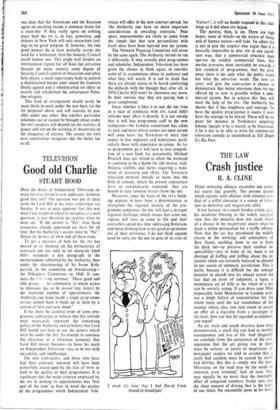Good old Charlie
TELEVISION STUART HOOD
Must the doors of Independent Television re- main for ever closed to new applicants, however good they are? The question was put in these terms by Lord Hill at his press conference last Sunday. It was at once apparent that this was what I was taught at school to recognise as a nuns question; it was therefore no surprise when he went on: 'If the answer is "Yes" then those companies already appointed are there for all time. But the Authority's answer must be "No"? Hence the demise of rvvw and all those tears.
To get a measure of how far the 1TA has moved in its thinking on the permanence of contracts one has only to set alongside turd Hill's statement a key paragraph in k. the memorandum submitted by the Authority, then under the chairmanship of Sir Ivone Kirk- patrick, to the committee on broadcasting— the Pilkington Committee—in 1960. It con- tains the foll,a ing sentence: 'Those good and able groups . the community to whom access to television has to be denied [my italics] by the restricted number of appointments the Authority can make inside a single programme service cannot have it made up to them by a system of turn and turn about.'
It has been the cardinal error of some pro- gramme contractors to believe that this attitude must necessarily represent the continuing policy of the Authority and to believe that Lord Hill would not dare to use the powers which were his under the Act. To attempt to convince the chairman of a television company that Lord Hill meant business—to leave his mark on Independent Television—was to be met with incredulity and indifference.
The new contractors, and those who have had their contracts renewed, will have been powerfully encouraged by the fate of Tww to look to the quality of their programmes. It is significant that the main criterion employed by the rra in making its appointments was 'first and all the time' to bear in mind the quality of the programmes which Independent Tele-
vision will offer in the new contract period, for 'the Authority can have no more important consideration in awarding contracts.' Fear apart, improvements are likely to come from the simple fact that new personalities with fresh ideas have been injected into the system.
The Network Planning Committee will never be the same again. The Authority intends to run it differently. It may actually plan programmes and schedules. Independent Television has been given the chance to think again, to consider some of its assumptions about its audience and what they will watch. It is sad to think that there are already voices to be heard comforting the diehards with the thought that, after all, in 1974 Charlie Hill won't be chairman any more. In their curious way they are paying him a great compliment.
Since, whether it likes it or not, the BBC lives in a state of symbiosis with rirv, Lord Hill's reforms must affect it directly. It is not merely that it will lose programme staff to the new companies—the London consortium has taken its pick and more whose names are open secrets will soon leave for Yorkshire—it must also expect to lose engineers and technicians, parti- cularly those with experience in colour. As far as programmes go it will have to face competi- tion of a new kind, for presumably Michael Peacock does not intend to allow the weekend to continue to be a home for old movies, mid- Atlantic telefilms and shows requiring a mini- mum of invention and effort. The Yorkshire television network intends to move into the field of comedy, which the present contractors have so conspicuously neglected; they are bound to take talented writers from the BBC.
Moreover, since the basis of the 1TA'S think- ing appears to have been a determination to strengthen the regional identity of the pro- gramme companies. the Bac will face a stronger regional challenge; which means that some BBC regions will have to come to life and their controllers spend less time addressing Rotarians and more thinking how to get good programmes out of their territories. I do not think anyone need be sorry for the BBC in spite of its cries of 'Unfair!'; it will no doubt respond to this chal- lenge as it did when Iry began.
The pattern, then, is set. There are high hopes, some of which—in the nature of things and of human nature—will fade. To admit this is not to join the sceptics who argue that it is basically impossible to alter rtv in any signifi- cant way, that a commercial structure must operate on crudely commercial lines, that market pressures must inevitably be towards a low standard of programmes, that the give- away show is not only what the public wants but what the advertiser needs. The next six years will give the contractors a chance to demonstrate that better television than ITV has offered up to now is possible within a com- mercial system. But to achieve this they will need the help of the ITA. The Authority has shown that it has toughness and courage. To have the quality programmes it wants it must have the courage to be liberal. There will be no point for instance in Yorkshire's acquiring Johnny Speight if he is merely to be frustrated, if he is not to be able to write for commercial television comedy as uninhibited as Till Death Us Do Part.


































 Previous page
Previous page